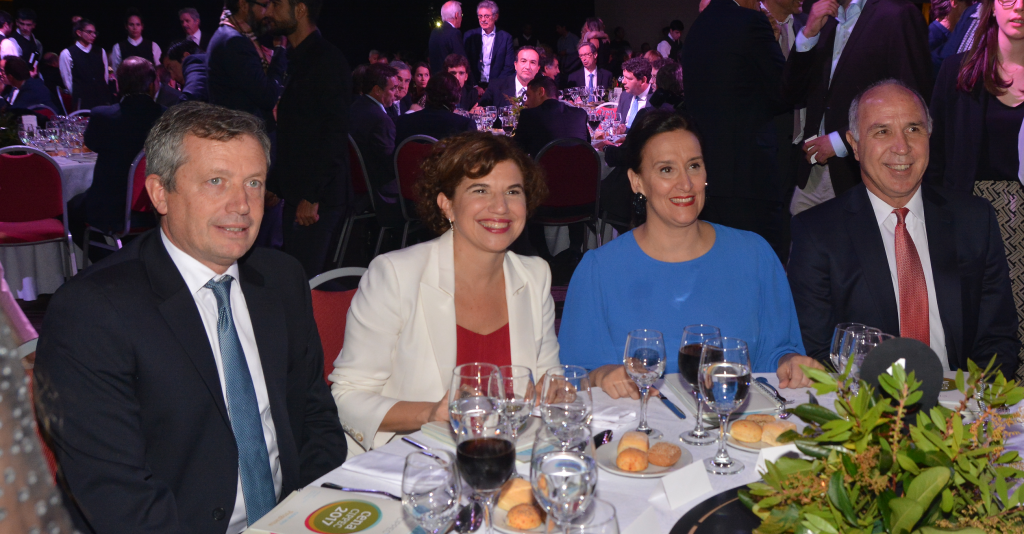In her speech to more than 1300 guests to the annual fundraising gala dinner at the Hilton Hotel, Julia Pomares, CIPPEC’s Executive Director, encouraged political leaders, trade unionists and businessmen to negotiate and compromise to achieve collective goals.
Last Monday, in its annual fundraising gala dinner, the Center for the Implementation of Public Policies Promoting Equity and Growth (CIPPEC as per its acronym in Spanish) urged politicians, unionists, businessmen and social stakeholders to conciliate and compromise. The gala convened more than 1300 national leaders, including Gabriela Michetti, Argentina’s Vice President, several Cabinet Ministers, governors, mayors, lawmakers and businessmen.
As the deadline for submitting the nominees list for the open, simultaneous and obligatory primaries (PASO as per its acronym in Spanish) to each party’s electoral board is only two month away, CIPPEC’s gala provided the different parties of the political spectrum with an opportunity to exchange viewpoints. Among the guests were Gabriela Michetti, Argentina’s Vice President; Ricardo Lorenzetti, Head of the Supreme Court of Justice of Argentina; Federico Pinedo, Senate’s President pro tempore; Emilio Monzó, Speaker of the House of Representatives; and Governors Gustavo Bordet, Miguel Lifschitz, Gerardo Morales, Horacio Rodríguez Larreta, Sergio Uñac and Alberto Weretilneck. Other political figures that attended the event were Sergio Massa, Juan Manuel Abal Medina, Margarita Stolbizer, Martín Insaurralde, Facundo Moyano, Nicolás Massot, Ernesto Sanz and Alfonso Prat Gay.
Also several public officials of the Executive Power were present at fundraising gala dinner, including Juan José Aranguren, Esteban Bullrich, Patricia Bullrich, Guillermo Dietrich, Luis Caputo and Carolina Stanley, among others.
In her opening speech, CIPPEC’s Executive Director, Julia Pomares, encouraged leaders to resolve the tension between individual interests and the common good by negotiating and compromising. ‘Striking a balance between the individual and the collective is not easy – it is a constant struggle between what each individual wants to do and what is more beneficial for the collective good. Resolving that tension requires disagreeing, conciliating and compromising. And none of these actions is trivial or insignificant. They determine a country’s thriving or stagnant future’ said Pomares.
‘We need to compromise so that we can all challenge the status quo we are trapped in. All of us here today must ask ourselves: What am I willing to lose so that everyone can win? ’ she emphasized. Pomares’s speech also included a brief description of the center’s main contributions during this year:
‘We helped improve skills of civil service in several provinces. We initiated a three-year project to plan the cities of the future and assess the impact of collaborative economies. We helped design a plan to reduce teenage pregnancy rates, we proposed a digital education system and we took pride in the creation of the Congressional Budget Office and the passage of the Access to Information Act, public policy proposals our institution repeatedly made for years. We also championed changes in the family and parental leaves regime and in family allowances’ she highlighted.
Currently, CIPPEC’s work focuses on improving the quality of public policies in multiple fields, including growth and macroeconomic stability, tax policies and tax structure, urban development, child protection and social integration in youth, campaign financing, high-level public administration strengthening, and policy evaluation.
CIPPEC’s Executive Director emphasized that the center offers a combination of medium-term perspective, expert knowledge and economic and political feasibility analysis. ‘We formulate ambitious, yet realistic, proposals, and we estimate the costs of implementation. This might seem somewhat obvious, but more often than not it is missing from the public debate. This practical knowledge leads us to dive into provincial experiences and international evidence’ added Pomares, who also pointed out that CIPPEC is part of the T20, a network of public policy institutions from G20 countries, and will therefore participate in the T20 Summit to be held on 29th & 30th May, in Berlin, Germany.
In addition, Jorge Mandelbaum, President of CIPPEC’s Board, described the center as ‘a capacity-building, intelligence-sharing institution’, made up of seventy experts, ‘which helps implement public policies at the national, provincial and municipal level’. ‘We do not support any administration or party whatsoever’ he emphasized and then added: ‘We collaborate with those who ask for our help without compromising our independence’.

